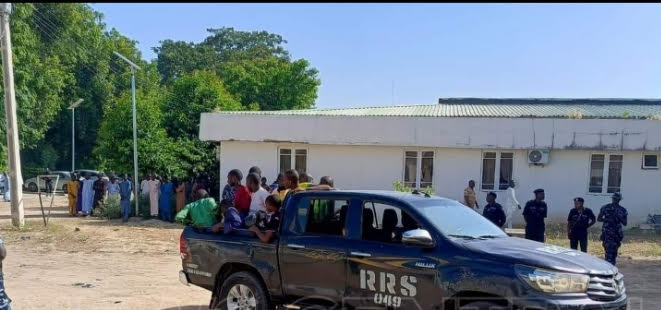A notable assembly formed at the Maiduguri High Court of Justice as the judgment approached for 11 individuals detained during the #EndBadGovernance protests in Borno State. The occasion drew the presence of family members, human rights advocates, and legal professionals, all there to show support for the individuals incarcerated for their protests. These demonstrations were tied to broader themes of governance and accountability, reflecting widespread public frustration over the state’s political climate. The atmosphere in the courthouse was tense, as many awaited the outcome of the trial that would determine the fate of those advocating for an improvement in their living conditions.
The specific allegations against the protesters emerged in a letter from Borno State Attorney General Hauwa Abubakar, describing the legal charges they faced. The 11 defendants were accused of causing a public disturbance, notably through their actions of displaying the Russian national flag while chanting slogans deemed provocative. The letter detailed the defendants and the circumstances surrounding their protests, which occurred on August 5, 2024, and emphasized that their actions were interpreted as a public breach of law under local penal regulations. According to the charges, these actions not only contradicted state law but were also seen as potentially inciting unrest within the community.
The legal document clarified that the state government was positioned as the complainant in this case, emphasizing the formal charges laid against the protesters. It was pointed out that the alleged display of a foreign symbol, in this case, the Russian flag, was used by the defendants as a form of peaceful demonstration against the existing government. However, the legal framework under which they were charged posed serious implications for the interpretation of rightful protest actions, raising significant questions about freedom of expression and civil rights within the region. These developments highlighted the precarious balance between governmental authority and the public’s right to dissent.
In light of the circumstances, a relative of one of the detained protestors, Hajara Shaibu, made a heartfelt plea to the state government, urging them to exercise leniency towards the accused and allow them the chance to reintegrate into society. This personal appeal underscored the human element lost amidst legal proceedings, reflecting the wider implications these decisions have on families and communities. Shaibu’s call for mercy resonated with ongoing societal discussions about the penalties imposed on individuals seeking to express their grievances and advocate for change in the governance of their state.
Simultaneously, the urgency of the matter was echoed by community leaders, including the State Chairman of the Civil Liberties Organization, Hassan Dahiru, who formally called for the immediate release of the detainees. His remarks highlighted a broader context: the deepening struggles with hunger and poverty that many citizens face, linking the need for political reform to fundamental human rights issues. He argued that the youth’s actions, whether seen as misguided or not, should not equate to charges of treason. This perspective underscored the sense of injustice felt in the community and portrayed the detainees not merely as lawbreakers but as individuals demanding accountability from a system that many believe has failed them.
In conclusion, the case against the detained #EndBadGovernance protesters has brought to the forefront crucial discussions surrounding the right to protest, governmental accountability, and the societal impact of legal rulings. As family members and advocates await the court’s decision, the implications of this trial extend beyond the individual defendants, touching on themes of civic engagement, youth activism, and the critical balance between law and justice. The ongoing situation stresses the importance of dialogue between the government and its citizens, especially in times of heightened political tensions, and challenges the state to reconsider how it addresses dissent within its populace.


